Highlights – April 2025
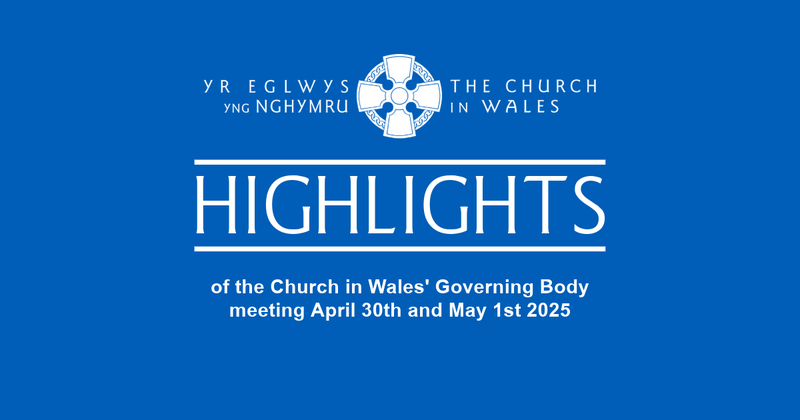
Members of the Church in Wales’ Governing Body met at Venue Cymru in Llandudno on Wednesday 30 April and Thursday 1 May 2025. The meeting was live-streamed, and you can read the summary and watch each session below.
Daily sessions
- Welcome to visitors
- Presidential Address
- Interaction with the President about his Address
- Church in Wales Membership App
- Diocesan Learning Community
- Private Members’ Motions
- Address from Dr Monica Attias
- Representative Body Report
- Standing Committee Report
- Question Time
- Bench of Bishops Report
- Bishops’ Portfolio Report
- Date of next meeting
Session 1
Welcome to visitors
The Archbishop of Wales, Andrew John, began the meeting by welcoming ecumenical guests and other visitors to the Governing Body from a number of church organisations across Wales and beyond. Members then voted to accept the minutes of the previous meeting as an accurate record.
Presidential address
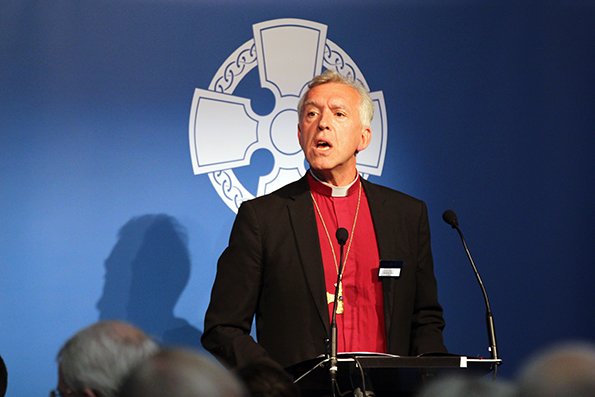
The Archbishop began his presidential address by speaking of the now famous slogan Cofiwch Dryweryn - “Remember Tryweryn” – a clarion call of anger over the destruction of a Welsh-speaking village in 1965 to create a reservoir for Liverpool. Just as Wales needed to remember who it was, shaped by triumphs and tragedies alike, so too did the Church in Wales, continually reshaped over its history. Archbishop Andrew said the Church must adapt to a fresh set of challenges with “courage”, and become more professional, grounded, compassionate, connected and creative.
Central to a more professional Church was robust and high-quality safeguarding, which was being led by a cadre of safeguarding officers, building a local culture of safeguarding excellence. But professionalism also went beyond safeguarding, the Archbishop said. The bishops had begun consultations on liturgical provision for those in same-sex unions. These listening exercises were being done not because agreement was guaranteed or easy, “but because respectful listening is itself a transformative act”.
Archbishop Andrew then recalled a summit on Welsh rivers hosted by the Church in recent months, which had underlined the significant role the Church still had to play, not as experts, but as convenors. “We can bring people together, help align values and efforts, and encourage collaboration where there might be fragmentation,” he said. The summit must not be a one-off, he said, and the Church must remain a core part of the public square. In 2026 there would be another public summit.
Artificial intelligence (AI) was another challenge the Church must face, Archbishop Andrew said, speaking of a conference he attended in Paris on the subject. AI could help find solutions in healthcare, education, climate change and more, but needed robust regulation and an international ethical framework. He urged members to read a recent Roman Catholic Church document on AI ‘Antiqua et nova’; faith must inform society’s approach to power and technology.
Another “calling card” of the Church must be compassion, he added, balancing prayer and protest, stillness and solidarity. And a new kind of ecumenism was developing in Wales, Archbishop Andrew believed. He praised the ministry of the Roman Catholic Archbishop of Cardiff, the Most Revd Mark O’Toole, who preached at the Governing Body’s service of Holy Communion earlier in the day. Different denominations were now learning to listen well to each other and to love each other – “honouring our traditions and finding new space for ministry and conversation”.
Lastly, the Archbishop said he was encouraged by the energy he saw across the province, a sign the Church was learning to extend the boundaries of its ministry, especially through the Church Growth Fund. There were church plants, rural ministry projects, schools work and more. “But please do not pit pioneering against parochial ministry”, he urged members – much of ministry was both grounded and experimental.
In closing, he said the Church in its glory days in the era of St David was also posed with challenges, but did not retreat. Today had its own challenges, but “our hope is the same as theirs – the power of God to guide and sustain us”.
Session 2
Interaction with the President about his Address
After a short break, members reconvened in small groups to discuss Archbishop Andrew’s Presidential Address and then ask questions.
Tony Mullins (Llandaff), a parish safeguarding officer, said he had felt dismayed recently after trying to defend the Church’s record on abuse one day, only for the following day the news to break of the conviction of the former Bishop of Swansea and Brecon Anthony Pierce for sexually abusing a child. Any other perpetrators known in the Church must be exposed and reported, he said. “We have to make our congregations feel safe.” In response, Archbishop Andrew said the Church could establish credibility by being clear about past problems: “It’s a painful thing, but it’s necessary.” There was more to do, especially in enabling survivors to shape the Church’s safeguarding procedures, and in cultivating a “professional curiosity” without becoming “thought police”.
Robert Charlton (Swansea and Brecon) praised the rivers summit and said bringing different groups together was already fostering beneficial relationships and unlocking new funding.
The Archdeacon of St Asaph, the Venerable Andy Grimwood, asked how the five areas Archbishop Andrew had mentioned connected with the Church’s number one priority – evangelism. Archbishop Andrew said the applications to the Church Growth Fund had been extremely varied, which was testimony to the Church’s ability to think outside of the box. The work of evangelism was being normalised, moving from the bishops to the Governing Body and the wider church, which was hugely exciting.
Gareth Jones (Bangor) thanked Archbishop Andrew for raising Tryweryn and Welsh identity, and praised the engagement with AI, which he suggested boiled down to age-old issues around what is true and what is not. Archbishop Andrew said it was clear AI played a part in creating false news, and that he was involved in an AI ethics group led by the Bishop of Oxford. The 2026 summit had no date, title or agenda yet, but would focus on what a good society looked like in Wales.
The Revd Rebecca Sparey (St Asaph) was concerned about the ecological impact of AI, noting one ChatGPT request cost the same energy as ten Google searches. How could this be reconciled with the Church’s green commitments, she asked. Archbishop Andrew said there was no reason why cutting emissions could not go alongside developing new technologies to mitigate pollution. Members must both curb fossil fuel use while also remaining “venturesome”.
The Revd Ruth Coombs (Llandaff) asked for clarity on what it meant to have “professional curiosity” when it came to safeguarding. How can good processes trickle down to start to shift a culture of deference, she also asked. Archbishop Andrew said culture took longer to establish than simply writing the right policies. Now, a non-threatening approach to ask curious questions about things which did not look right needed to be built. It was not the curiosity of the professionals, but a curiosity for everyone to adopt.
The Archdeacon of Margam, the Venerable Mark Preece (Llandaff), wondered if the Church was actually doing ecumenism rather than just talking about it. He had heard some saying simply working in a ministry area with other Anglican churches was ecumenical enough. Archbishop Andrew said the enormous challenges facing Wales required working together between Churches. Ecumenism was more than just praying together but being alive to the problems Wales was facing.
Canon Richard Wood (Bangor) asked for comments on the misuse of authority in the light of the recent report Walking in Integrity by the Standing Doctrinal Commission. He also asked if there was guidance for Ministry Areas which were struggling to recruit safeguarding officers. Archbishop Andrew said the Walking in Integrity report got to the heart of one of the most difficult aspects of safeguarding, issues of power and control in pastoral ministry. More work on this was underway, he said. He also expressed concern at safeguarding officers being shared across multiple Mission or Ministry Areas.
The Revd Dr Kevin Ellis (Bangor) suggested the Church could model to wider society wrestling with issues such as end-of-life care how to hold diverse views together and listen well. Archbishop Andrew said the bishops were committed to discerning the way forward on same-sex relationships together with the wider Church and had been “profoundly impressed” so far by the gracious listening between factions.
Chris Dearden (Bangor) asked how congregations could see the Church being more professional, grounded, creative, connected and compassionate. Archbishop Andrew said it was critical decisions taken by the Governing Body did filter down to Mission and Ministry Areas. A vital component of this must be Church schools, which brought the Church into contact with young people of all ages. He also said the Church should be known widely by its “joyfulness” in “cascading the good news”.
Session 3
Church in Wales membership app
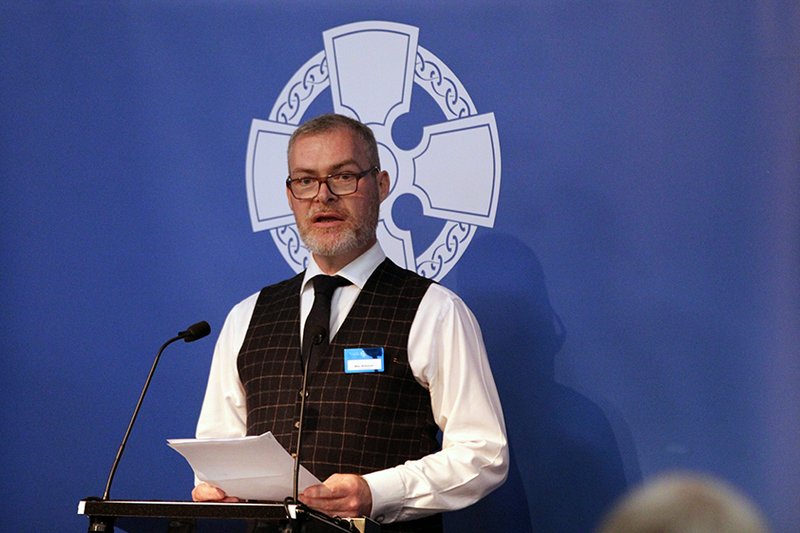
There was a presentation from Mike Wakeman, Director of IT, on the Church in Wales Membership App, which allows churches to record their attendance and service data. About 30% of churches were currently using the app, which meant province-wide statistics were getting more accurate, but more uptake would improve this further.
Provincial Sunday attendance averaged 29,301, which was slightly less than before the covid pandemic and suggested attendance “may be stabilising”. It was highlighted that the app was not just for provincial level stats, but to help local churches track their own activities.
The Revd Rebecca Sparey (St Asaph) said her Mission Area began to use the app in 2023, but found it was clunky and hard to use, and did not helpfully return comprehensive data.
The Revd James Henley (Monmouth) echoed some of Revd Rebecca Sparey’s concerns around analysing the data and comparing trends, but praised his diocesan team for helping smaller churches engage with the new system.
The Archdeacon Missioner in the Diocese of St Davids, the Venerable Mones Farah, asked if there was any insight into the rising numbers post-pandemic – were these mostly new worshippers or previous members who were now returning after covid?
Replying to the questions, Mr Wakeman said there was no analysis yet of whether congregants were new churchgoers or returnees post-covid. He thanked Ms Sparey for her “robust and honest feedback” and noted there was work required to improve the app and its reporting features.
Diocesan Learning Community
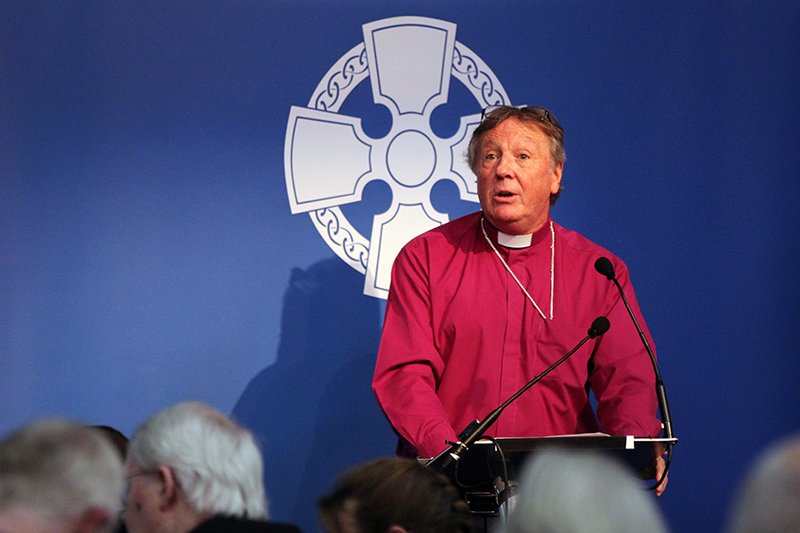
The Bishop of Swansea and Brecon, the Rt Revd John Lomas, introduced to members a report on the Learning Community which met in November. He said each of the Community’s sessions related to particular areas of ministry, covering administration, culture, identity, vocations and wellbeing. It was vital the lessons learned at the Community were fed back into the wider Church, he added. The discussions were also very useful to the bishops, especially in highlighting a “rising unity of purpose between the ministry areas”.
James Laing, the diocesan secretary in Llandaff, then spoke about a related Ministry Area survey, first asked for by the Governing Body in 2023. The survey covered finance, governance and structures, and hoped to identify what areas had in common and where they differed. There were 109 responses from Ministry Areas, about 80% of all areas being involved.
The findings suggested outreach was generally happening in most areas, while evangelism was more hit and miss. Lay involvement was more common, while small groups were more commonplace in towns than in rural areas. New forms of ministry were generally happening, but best when they complemented traditional worship. Most areas were confident about their governance arrangements, but were less sure on the role of trustees and charity regulation. There were concerns around finance, with many areas reporting that finance discussions tended to dominate discussions around mission. When it came to giving, almost no areas reported local donations were sufficient to cover the cost of ministry. Views were generally positive on buildings and the effectiveness of safeguarding. There were very mixed views on whether areas felt confident about the future.
Mr Laing said a shift towards working as a team in ministry areas away from individual churches was beginning to happen. Growth was happening, even if it was patchy and difficult to measure at times. Buildings were valued both for their role in mission and as community assets. There were also some recurring concerns: mixed confidence in evangelism, a lack of resources both human and financial, fears over administrative burdens, the lingering parochial mindset, and a need for more training.
The Archdeacon of St Asaph, the Venerable Andy Grimwood, noted recent Bible Society research which suggested a “quiet revival” of Christian faith was underway in Britain. He posed the question “Was there any evidence this was taking place in Wales, and if so, where?”
Bob Evans (Monmouth) asked for all information coming from the Learning Community and survey to be shared on the ground with Ministry Areas to help them learn what worked elsewhere.
Hannah Rowan (Monmouth) cautioned many of the questions relied on quite subjective notions.
Bishop John responded by noting that in the 11 years since Ministry Areas were introduced lay people had taken on huge responsibility. The Church should draw on their significant expertise in different fields. Replying to Archdeacon Grimwood, he said he only had anecdotal evidence of certain churches in his diocese which were thriving.
Mr Laing added there was anecdotal evidence from his diocese of record attendance at Easter services, but more work needed to be done. He acknowledged the survey was a mixture, with impressionistic questions about how people were feeling mixed in with more hard factual questions.
Private Members’ Motions
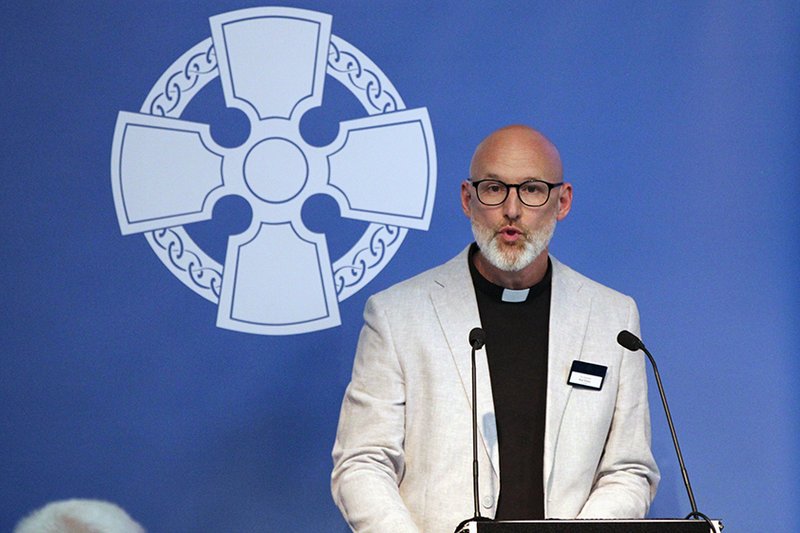
The Archdeacon of Llandaff, the Venerable Rhod Green, proposed a motion to extend the term of office for those serving on Ministry Area councils from one year to three. This was vital for good governance, he argued, and would bring continuity and stability as members matured into their roles. It would also mean Ministry Area Leaders would be freed from the stress of recruiting new councils every year.
Michael Dean (Bangor) said he could not support the motion, which was a good idea in theory but deeply flawed in practice. It should only be revisited once the very concept of ministry areas had been written into the Constitution in the first place.
The Archdeacon of Wrexham, the Venerable Dr Hayley Matthews (St Asaph) supported the motion, noting the burden of electing new members annually.
Tony Mullins (Llandaff) asked if there should be a mandatory retirement age for council members. For elected members there was no age limit, apart from church wardens, the chair explained.
The Revd James Henley (Monmouth) backed the spirit of the motion but rose to suggest his own even more flexible amendment. It would allow each vestry meeting to agree its own terms of office between one and four years, through its standing orders, adapting for their own particular circumstances.
Archdeacon Green opposed the amendment, worrying it was too administratively complicated and might prompt Ministry Area councils to keep the simpler annual elections.
Hannah Oxenham (Monmouth) suggested there could be a range of template standing orders to choose from to minimise administrative complexity.
The Archdeacon of Carmarthen, the Venerable Matthew Hill (St Davids), favoured the original motion, which locked clear rules into the Constitution and avoided messiness around standing orders.
The Archdeacon of the Gwent Valleys, the Venerable Stella Bailey (Monmouth), opposed the amendment because it would create more divergence and less unity between ministry areas (and may even drag archdeacons like her into drama over term limits).
The Archdeacon Missioner in the Diocese of St Davids, the Venerable Mones Farah, opposed the amendment, arguing it would lead to conflicting structures, echoed by Hannah Wilkinson (St Davids) and later by Canon Richard Wood (Bangor).
Sue Henley (St Davids) noted her diocese had already created template standing orders for all ministry areas, which still created space for local flexibility. These orders gave clarity and structure to meetings.
Responding to the debate, Mr Henley said he did not think his amendment would create “organisational chaos”, and that divergence in practice between Ministry Areas would be inevitable under the unamended motion too.
The amendment was then put to the vote and defeated, before Archdeacon Green’s original motion was then put to the vote and passed.
Session 4
Dr Monica Attias’s address
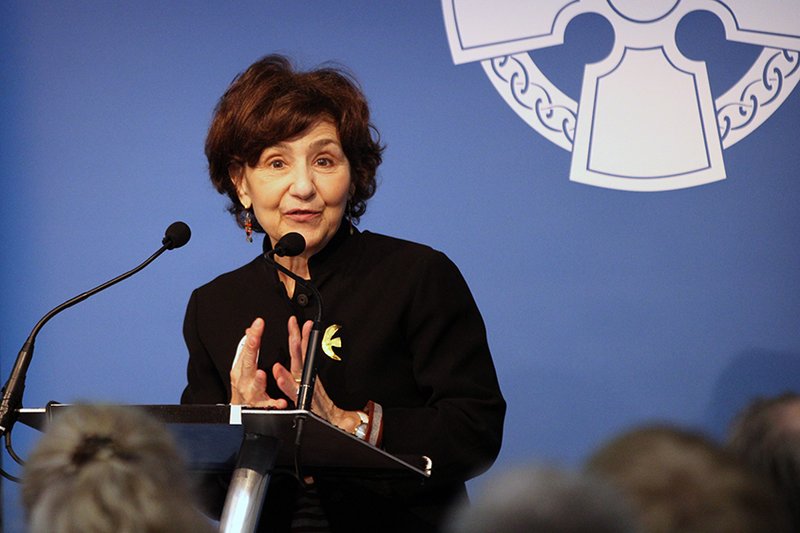
Archbishop Andrew introduced to the Governing Body Monica Attias, who works with migrants and refugees on behalf of the Community of Sant’Egidio, a Catholic social action movement. Dr Attias has been part of the community since 1978 and been focused on asylum and migration since 2000. Archbishop Andrew said when he last met Dr Attias at the Vatican he had been struck by the affection with which she was held by the displaced people she had served and brought to Rome.
Dr Attias began by explaining the Community had been founded in 1968 by a group of students who sought to live out the gospel together, with daily common prayer as their priority. The core theme of Sant’Egidio was friendship – friendship with the poor and friendship with those who are different. Members of the Community – now 70,000 strong in almost every continent on Earth – were normal people with paid jobs who sought to make room in their lives for those who were underprivileged. The late Pope Francis summed up the Community with three Ps – prayer, peace and the poor, Dr Attias said, and this remained their lodestar.
The focus today was on migrants, the homeless and the elderly, she added, which she had discovered was also a growing problem in Wales. Homelessness was up 8% in 2024, while there were also worrying signs of a rise in child poverty.
The world faced challenges unseen since the Second World War and the Church must resist the temptation to look inward and close its eyes to the world. The passion for ecumenism and international encounter had diminished since the optimism that followed the end of the Cold War, she lamented, and war as a means to resolve conflict was now a regular occurrence. Scepticism about dialogue abounded, but “what would the world be like without prayer and fraternity?”
People today were disoriented, struggling to find their identity, “sleepwalkers – living but without wanting to see what was going on around them”. Fearful Europeans were trying to turn their continent into a fortress, but Sant’Egidio had helped set up safe routes for refugees, so they could avoid the dangers of people traffickers and risky sea crossings. Some 80,000 people have now reached Europe through this programme, Dr Attias reported.
“We have to perform a revolution of tenderness,” she said, quoting the late Pope Francis. Christians were called to be tailors, repairing the torn fabric of our societies. “Persistent prayer can move mountains, and history is full of surprises – there’s still hope!”
Members then asked questions of Dr Attias, beginning with the Revd Andrew Lightbown (Monmouth) who lamented as a “theological and spiritual disgrace” sky high numbers of homeless people in his town of Newport. This was a challenge to all Churches, including the Church in Wales: to befriend the unloved. He thanked Dr Attias for reminding the Governing Body of the non-judgmental friendship of Christ, and the need to “get some divine muck under our fingernails”.
Canon Richard Wood (Bangor) recalled compassion was not “feeling sorry for” but “suffering alongside” someone. Was there anything Dr Attias could share about how Christians can make that journey towards friendship out of pity?
Dr Attias said whatever move was made must be done together, in community. Serving the poor required commitment and time, but it brought great joy. And do not hand everything over to the professionals or charities, she urged. “Let’s be less professional, offering opportunities to young people in our parishes and even outside the Church” to step into service.
Session 5
Representative Body report

Professor Medwin Hughes presented the report from the Representative Body (RB), which he chairs. The RB continued to carefully steward the Church’s funds through a challenging economic climate, and he told members of a new ethical investment policy which would come to then in September for approval.
In response to the 300% increase in safeguarding casework over the last three years, new appointments were being made in HR and safeguarding. The surge in cases was actually a good sign of progress, as victims felt they would be listened to. On top of the necessary apologies to survivors, there had also to be the proper infrastructure to deal with issues.
The RB report included a description of the projects funded by the £100m Church Growth Fund, which included seven Tier One grants. Four more costly Tier Two grants had also been approved, supported by three project managers, he reported. “I’m amazed at the breadth of engagement and the real creativity going on in the province,” he said. But as well as celebrating the “big stories”, Professor Hughes said there were also many less heralded churches who had been tirelessly plugging away. So, the RB would explore what resources might be released to support these more traditional ministries.
Opening questions, the Revd Ruth Rowan (Monmouth) asked if the Fund would consider applications from ecumenical initiatives.
The Revd Mark Thomas (Swansea and Brecon) asked how far efforts had gone with excluding entirely from the RB’s investments companies involved in armaments, pornography and predatory lending.
The Revd Ruth Coombs (Llandaff) asked for more detail on the money involved in the Tier Two project managers.
Responding, Professor Hughes said the question of ecumenical projects would be considered by the committee and he did not want to pre-empt their deliberations. He also said the ethical committee was indeed aiming to reduce such investments to 0%. The project managers had a specific sum set aside to cover each diocese for five years.
The report was then put to the vote and approved by members.
Report of the Standing Committee

Tim Llewelyn (St Davids), the chair of the Standing Committee, introduced their report. Future topics to be discussed at an upcoming residential included age limits, the Dignity Charter, a risk register for non-financial risks, and a subsequent report on these matters will be brought to the Governing Body in September, he said.
The Revd Dominic Cawdell (St Asaph) asked how the agenda of the Governing Body was set, noting the current meeting had not tackled very many “important issues” facing the Church in Wales.
Responding, Mr Llewelyn said the agenda is set by the business and appointments committee, before being approved by the standing committee. There were various necessary items each time, but the committee would like the agenda to be more representative of members priorities and what was going on in the “outside world”.
The report was then put to the vote and approved by members.
Mr Llewelyn then presented the committee’s report on governance and legal matters, and proposed four motions. The first would create a special select committee of Governing Body members to amend the Constitution so that it included the concept of ministry areas. This would need changes to almost every chapter and would be a “substantial task”, he said, but doing it in a committee would avoid lengthy and complex drafting happening inside the cumbersome procedures of the Governing Body. There was no debate before the motion was put to the vote and passed.
Mr Llewelyn then moved his second motion, which would change the definition of “confirmed communicant”. Several years earlier the bench of bishops had permitted church members to receive Communion before being confirmed, but the Constitution still reserved some roles for communicants who had also been confirmed, he explained. But a drafting error had been identified in the definition, and this motion would correct it.
The Revd Andrew Lightbown (Monmouth) asked why the amendment described the Rite of Confirmation as “sacramental”, when Anglicanism traditionally did not recognise confirmation as a sacrament. This was then proposed as an amendment, which was opened to debate.
The Archdeacon of St Davids, the Venerable Paul Mackness, explained the Church in Wales’s catechism understood there to be two sacraments, but also described confirmation as a “sacramental rite”, and so would oppose the amendment.
Mr Lightbown then withdrew his amendment, before members voted to approve the original motion.
Mr Llewelyn moved his third motion, which would remove some more redundant provisions in the Constitution, relating to deaconesses, lay workers, and stipendiary readers. There was no debate, and the motion was passed, as was the final recommendation approving the whole report as a whole.
Question Time
The first question from the Revd Matt Davis (Monmouth) asked what consideration the Church had given to responding ethically, theologically and practically to the “inevitable use of AI in everything from emails to sermons and prayers”.
Responding, Archbishop Andrew said the Church’s response to AI to be “theologically grounded, morally responsible and practically engaged”. AI prompted Christians to reflect on what it meant to be human, and while it could mimic human tasks such as composing music or generating text it lacked self-awareness, spiritual consciousness or moral responsibility. “It does not experience love, suffering nor redemption” and cannot replicate genuine spiritual depth. The Church cannot reduce itself to “algorithmic output” and must work out if AI fosters spiritual encounter or distances worshippers from God, he argued. Could it reflect God’s creative image at work, or be a hubristic modern kind of Tower of Babel? And that was considering AI’s vast consumption of energy and carbon footprint, or concerns over copyright infringement. Guidelines for AI use in sermons, prayers and liturgies needed to be developed, and perhaps St Padarn’s could include training on digital ethics and technology, Archbishop Andrew suggested: “The Church in Wales is called to a path of discerning engagement, rather than blindly embracing or rejecting AI.”
In response Mr Davis asked what timeline there was for setting up working groups or writing guidelines.
Archbishop Andrew said not yet but he would refer that to the standing committee.
The Archdeacon of Meirionnydd, the Ven Robert Townsend (Bangor), then asked if ministry area safeguarding officers (MASOs) should be written into the constitution and receive an ex officio place on a ministry area council.
Archbishop Andrew replied that the role of MASO can be carried out by one person or a team covering a wider area, and so it would be difficult to create an ex officio place on councils for them. The provincial safeguarding team also felt that automatic trusteeship on a council could be counterproductive if it scared off suitable candidates. But MASOs could be given right of attendance at an area council without becoming a member, he concluded.
Robert Charlton (Swansea and Brecon) asked what timescale there was for the investigations into the former Bishop of Swansea and Brecon Anthony Pierce, who was recently convicted of child sexual offences, as well as into the failure in 1993 for Church figures aware of his abuse to pass this on to the authorities. “Time is of the essence and public confidence appears to demand the earliest possible conclusion,” he warned.
In response, Archbishop Andrew assured members the constitutional disciplinary process would be followed to the letter. This would be accelerated because there was no need for a tribunal to establish the facts after his criminal conviction, but it had to wait until Mr Pierce had decided whether to appeal or not. Normally, once a tribunal referral is made it would take between three and five months to conclude.
The external review of the Church’s handling of the 1993 report was already underway, and the reviewer had total independence in undertaking the work, Archbishop Andrew said. The hope was a draft report would be completed in May, although it may not be published until later in the summer.
Mr Charlton asked if there could be an update on the situation if there were any outstanding issues by the next Governing Body meeting in September.
Cathryn Brooker (Monmouth) then asked what the Church’s strategy was for closing and closed churches, and who was responsible for open churchyards in closed churches.
In response, the Archdeacon of St Davids, the Venerable Paul Mackness, said closure of churches was the job of each ministry area, in consultation with their diocese, archdeacon and bishop. Dioceses each had local procedures and there was no single national strategy. Once a declaration of redundancy is made by the bishop, responsibility for the building passes to the RB. There was now a portfolio of about 100 buildings so managed, and the RB aimed to find new uses for all of them. There was no national policy to see churches close, but nevertheless closures were expected in the near future and the process could be streamlined. The closure of a church did not affect the churchyard, which remained the responsibility of the ministry area. A churchyard can only be closed when there is no more space for burials, and a closed one usually remains the responsibility of the ministry area.
Ms Brooker said in response it was inevitable many churches would close in the next decade, including in her own Ministry Area. It was hard to find people to look after the open churchyards of closed churches, and more money needed to be found for this she said, otherwise the message would be sent to the watching world that “religion in Wales is dead”.
Session 6
Bench of Bishops report
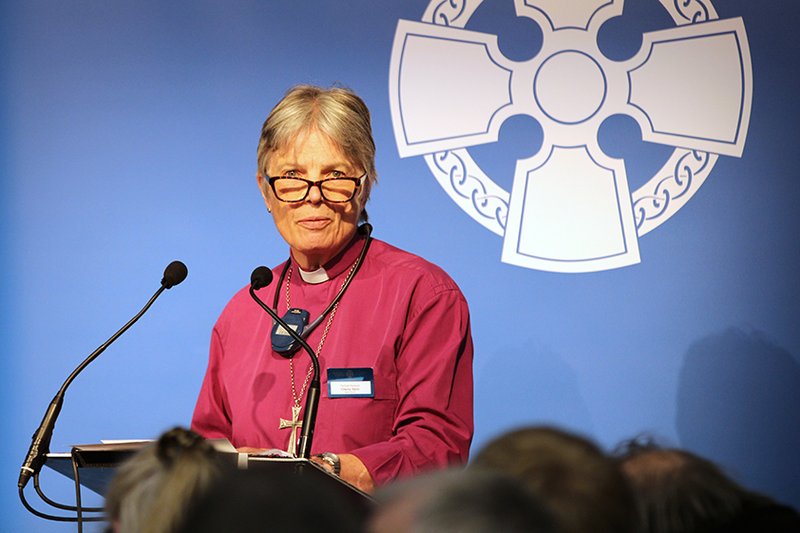
The Bishop of Monmouth, Cherry Vann, introduced the report from the Bench of Bishops of their work over the past six months. She drew attention to the listening exercise on regarding same-sex unions, started because the experimental blessings for same-sex couples introduced in 2021 would elapse next year.
These sessions had now taken place in all six dioceses. She also said the bench had introduced a bill to create a new confirmation rite, which would be debated at Governing Body in September.
The Archdeacon of the Gwent Valleys, the Ven Stella Bailey (Monmouth), praised the report Walking in Integrity, which explored the use of power and spiritual abuse. “We should be proud of this thinking and it could be offered to the wider Church,” she said, and perhaps even secular society too.
Hannah Rowan (Monmouth) also welcomed the Walking in Integrity report, but said it was important to be honest that the Church itself was still on a journey towards a better use of power.
Bishop Cherry said the report could be shared more widely, and that the bishops had already benefitted from training on the use and misuse of power. There was other work underway with ordinands also.
Bishops’ portfolio report
Bishop Cherry introduced a report from her personal ministry portfolio, which she insisted was much more than just the work of clergy and lay ministers. “Ministry is the work of the whole people of God – we are commissioned at our baptism to shine as lights in the world and continue in Christ’s work,” she told members. And if the Church wanted a more diverse cohort of ministers, it first needed to become more diverse. “Ministry in all its outworkings has implications for evangelism and discipleship – this is the work of us all, not just the clergy.”
Members then watched a video about the most recent ministry conference in March, which focused on wellbeing. Canon Dr Trystan Owain Hughes, the Church’s Director of Ministry Development, said the Church knew walking alongside people in pastoral work was rewarding but also took its toll on ministers. Pressures and expectations can build up, leaving clergy “weary and bruised”; some have gone off on sick leave or even abandoned their vocations over these burdens. “Are we offering the structures needed to care for those who care for others?” he asked.
Plans were afoot for a mid-ministry training course at St Padarn’s, as well as projects with outside charities to help provide counselling and wellbeing support for clergy, Dr Hughes said. The Church was also launching an initiative with St Luke’s charity to provide a safe space for ministers to reflect on their work via monthly one-to-one pastoral supervision sessions.
The discernment process was also being reformed, shifting the criteria to become “qualities to be inhabited” and now including references for the first time to safeguarding, Welsh culture and language, and youth ministry. There would now be a two-stage provincial process, trying to build the confidence of candidates and embedding more pastoral care.
The Revd Professor Jeremy Duff, the principal of St Padarn’s, updated the Governing Body on the Institute. Numbers of students remained strong, he reported, with steady intakes of ordinands for stipendiary ministry (of which a third were under 30 and all split evenly by gender). This was notable because ordinand numbers UK-wide were falling, with the Church of England seeing a 44% drop in full-time ordinands. “This is a testament to the joined-up work here in Wales,” he said.
The pattern of training for both full-time and part-time students was being tweaked to minimise the travel to Cardiff. But theological study in Welsh universities was dwindling away, and so it was up to the Churches to maintain theology in Wales, especially the ability to translate from ancient texts into Welsh, Prof Duff warned.
St Padarn’s was also focused on ministerial wellbeing throughout their careers, by fostering networks across dioceses, and building a culture of positivity, hope and thriving within the Church in Wales. Yes, there are challenges and irrational optimism was unhelpful, but cynicism “kills wellbeing”, he said.
The Revd Ruth Rowan (Monmouth) asked if St Padarn’s could open up its intentional leadership training programme beyond just stipendiary clergy, as many significant leaders in the Church were non-stipendiary.
The Archdeacon of Wrexham, the Venerable Dr Hayley Matthews (St Asaph), requested more pastoral care and support for those not selected for ministry, to help them find new fruitful futures rather than carrying an “open wound” of rejection for years to come.
Tony Mullins (Llandaff) asked if congregants could be educated into how to protect their clergy’s wellbeing, building a culture of not bothering ministers at unusual times.
Bex Bristowe (St Asaph) asked if the renewed discernment process was accessible for those who had not gone through higher education and those who were neurodiverse. The Revd Geraint John (Llandaff) echoed this concern.
Canon Dr Mark Clavier (Swansea and Brecon) said in his career across three provinces he had never known clergy to be so demoralised. The narrative of decline was pervasive, and rural clergy in particular were given almost impossible jobs and expectations. Ministry had to be restructured to allow clergy to thrive, rather than simply layering on top a thin layer of wellbeing services. Congregations need to learn it was part of their job to look after their clergy, he added, a point Moira Randall (Llandaff) agreed with.
The Archdeacon of St Asaph, the Venerable Andy Grimwood, asked if there was a socio-economic breakdown of those training for ordination at St Padarn’s, because it was important there were training opportunities for those who could not get A-Levels or degrees.
The Bishop of St Davids, Dorrien Davies, said the clergy had to take responsibility for taking their holidays, to wind down and be with their families. Priests cannot afford not to look after themselves: “Burnout is not an option – we have to be resilient, refreshed and rested for the task that lies ahead,” he said.
Bishop Cherry replied that the bench knew how devastating a rejection from ordination could be, but that it was the sponsoring bishop’s responsibility mainly to pick up the pieces. She agreed the laity must look after their clergy, but also that clergy had to set realistic priorities: “God only asks us to do what is possible.” Working in a team across a ministry area could really help with this, she added.
Dr Hughes said the new Zoom-only non-interview first stage of discernment would help encourage those from undereducated or neurodiverse backgrounds, and added training on neurodiversity, utilising material from the Church of England, was already available.
Prof Duff said non-stipendiary ministers could already attend the intentional leadership phase of the CMD training if their bishops agreed (although this would be hard for those with secular jobs). Feedback showed working class students currently felt well-supported, and cautioned against the presumption such people should not try to acquire formal qualifications. “It’s about how to have good ways into training, not avoiding it,” he explained. Some 15% of students were neurodiverse, he added, which was slightly above the rate in wider society, although there remained a challenge to support them beyond training into curacy.
Date of next meeting
The Governing Body will meet for its Ordinary Meeting on Thursday, 18 September 2025 and Friday, 19 September 2025 in Newport.